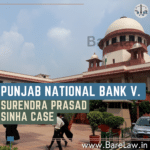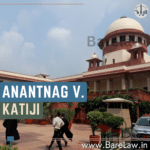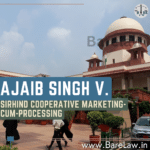
Table of Contents
Pomal Kanji Govindji v. Vrajlal Karsandas Purohit (AIR 1989 SC 436 : (1989) 1 SCC 458) | BareLaw
The Supreme Court’s judgment in Pomal Kanji Govindji v. Vrajlal Karsandas Purohit (AIR 1989 SC 436 : (1989) 1 SCC 458) sheds light on the concepts of equity of redemption and tenant rights under Indian property law.
Background and Parties Involved
The case stemmed from a mortgage executed on April 20, 1943 where the father of the plaintiffs mortgaged properties to defendants on very onerous terms including a long period of 99 years within which to redeem. The lenders, taking advantage of the weak financial position of the mortgagor, incorporated harsh clauses and brought in tenants into such premises.
Legal Dispute and Proceedings
The plaintiffs filed an action for redemption before expiry of ninety-nine years on the ground that ninety-nine-year period provided in the mortgage deed constituted a clog on equitable right to redeem. Defendants resisted it mainly through tenant defendants who relied upon provisions contained in Bombay Rent Act. Trial Court found for plaintiffs, a decision affirmed by both appellate Courts who held that terms were oppressive as well as clogging equity.
Supreme Court‘s Judgment
Appeals by tenants were heard by Supreme Court against reliance on Bombay Rent Control Act. There was thus need for court to balance between rights of mortgagors to redeem their properties with tenant who were introduced by lenders. This position had been upheld by appellate court regarding these particular tenants not being protected under provisions of Bombay rent control act.
Implications and Conclusion
Pomal Kanji Govindji v. Vrajlal Karsandas Purohit is considered one of those cases that have outlined how judiciary protects mortgagors from oppressive mortgage conditions while also explaining more about tenant protection in leasehold legislation. As regards this case, there is nothing more significant than fair and equitable terms during transaction involving mortgages or between land owners and people living in such houses in India.
Summary:
The article zeroes in on the Supreme Court case Pomal Kanji Govindji v. Vrajlal Karsandas Purohit, examining its implications for equity of redemption and tenant rights. It looks into background; legal dispute and the court’s judgment stressing the importance of protecting mortgagors from oppressive mortgage terms and balancing tenant rights.





